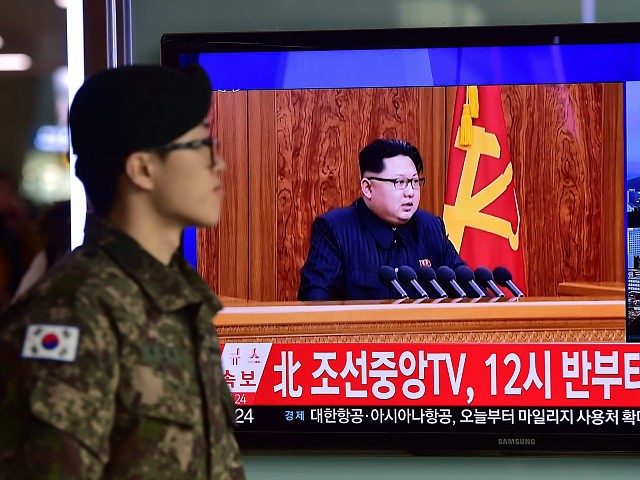The Trump administration faces a significant foreign policy test this weekend: Getting China to restrain North Korea’s nuclear weapons program as President Trump hosts his first summit with Chinese President Xi Jinping.
Publicly, Trump has taken a tough position, warning China – North Korea’s main sponsor – that if it will not help, the U.S. will take care of it by itself, raising questions about potential military action.
However, what happens behind closed doors remains unknown, especially with a new U.S. president and an unclear U.S.-Asia policy.
Subduing North Korea is a complex issue that has bedeviled three previous presidents. In the meantime, Pyongyang has made strides with its program, recently successfully launching a missile with solid fuel that makes detection harder.
But Trump has pledged not to let North Korea go nuclear on his watch, despite few good options.
Retired Lt. Gen. Wallace “Chip” Gregson Jr., who commanded Marines in the Pacific, said Trump should tell China if it cannot or will not help restrain North Korea, the U.S. will strengthen the capabilities of its allies in the region, particularly Japan and South Korea.
Gregson, who is now the senior director of China and the Pacific at the Center for the National Interest, said it might even be necessary to reintroduce nuclear weapons to the region.
“We need to reinforce alliance capabilities in a manner that is suitable to reestablishing deterrence, perhaps even adopting a Cold War posture – with the national emergency airborne command post, airborne 24 hours a day, reintroducing nuclear weapons to the region,” he said at a recent breakfast discussion hosted by the Center for the National Interest.
“All these things should be on the table and all these things should be discussed in the context of reinforcing our alliance capabilities and our alliance obligations,” he said.
“Aerial intrusions into Japanese airspace are at high Cold War levels. During the Cold War, it was Russian intrusions, now it’s Chinese intrusions,” he said.
Wallace also recommended, in light of the Trump scrapping the Trans-Pacific Partnership, that the U.S. negotiate a new trade deal with Japan.
“We need some deal with Japan very quickly to reinforce the trade relationship to enhance and maintain and improve our relationship with Japan,” Wallace said.
With Taiwan, Harry Kazianis, director of defense studies at The Center for the National Interest, said the U.S. should try to reinforce the status quo – that Taiwan is not a separate country, but make it very difficult for Beijing to invade the island.
He said he also expects Trump to reaffirm the U.S.’s One China policy, which is “very different from what Beijing believes it is.”
Another potential topic of discussion between Trump and Xi is on the South China Sea, where Beijing has built artificial islands and is increasingly adding military equipment to them, despite territorial claims by other countries.
“They seek to dominate the seas around them as they get more powerful,” Kazianis said. If China seeks to cut off others’ access to the waters, it would be a problem for the U.S. and regional allies, he said.
“There’s $5 trillion in seaborne trade that passes through the South China Sea. $1.2 trillion is U.S. seaborne trade. So that means jobs. Also much of the natural resources that power the economies of Asia must pass through the South China Sea in some way,” Kazianis said.
A trade deficit between the U.S. and China is also expected to be a major topic of discussion. Trump criticized the trade status quo with China during his campaign as unfair.
Dr. Nicholas Lardy, Anthony M. Solomon Senior Fellow at the Peterson Institute for International Economics, said he did not expect much out of the summit on the trade and investment front.
“I think U.S. trade policy is not yet in place – it’s still being hotly debated internally,” he said. “Certainly we’re not going to impose a unilateral tariff on China – I don’t think China is going to be named a currency manipulator.”
“I think the Trump administration is likely to make greater use of trade enforcement actions against China, which is basically extending a policy that began in the Obama administration,” he added. “This may be helpful for some U.S. industries and firms, but I think it’s unlikely to bend the curve in terms of the large and still growing trade deficit with China.”
Kazianis said despite all the possible areas of disagreement, both leaders have an incentive to make the summit look successful.
“I think we have to keep in mind – actually Trump and Xi Jinping have one similarity that I think is very important – they both want to make their countries great again,” said Kazianis.
While he said it could be dangerous, “there could be areas of opportunity where both sides come together on things,” he said.
“I don’t think the Chinese are going to want to make tremendous waves.”

COMMENTS
Please let us know if you're having issues with commenting.